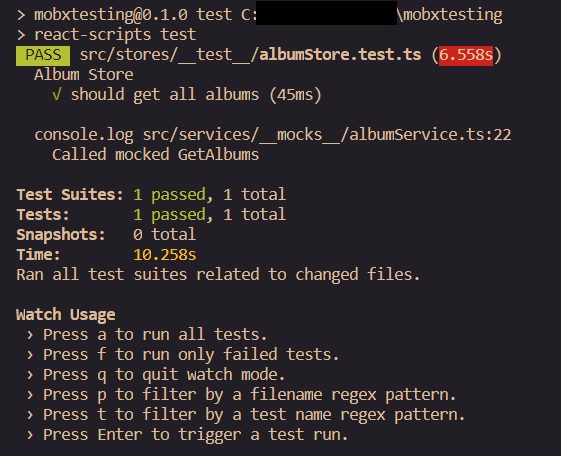React and Mobx Store Unit Testing and Mocking With Jest
This project was bootstrapped with Create React App.
Researching how to do unit tests of a Mobx store, I came across examples that, although useful, were not exactly what I was looking for, as their stores did not access a http service, as was the case of the project I was working on.
The project stores did not receive instances of services by dependency injection, so it was not possible to inject a mock of the service.
Enter Jest
As the project uses Jest, I realized that I could leave Jest in charge of mocking the services. And I found it was quite simple.
Tools
- mobx and mobx-react:
$ npm i mobx mobx-react --save-dev - jest
- @types/jest:
$ npm install --save @types/jest - http://jsonplaceholder.typicode.com
Basic folder structure before
src/
components/
albumComponent.tsx
services/
albumService.ts
stores/
albumStore.ts
App.js
index.js
...
Basic folder structure after
Using jest for testing, we create a test folder in the same level of the component we are testing. In our case, the albumStore.ts
For the mock, we create a mocks folder in the same level of the component we want to mock. Note: the name of the mock file must be the same of the original file (albumService.ts) being mocked, so jest can undestand and mock during the tests.
So the folder structure looks like as following:
src/
components/
albumComponent.tsx
services/
__mocks__/
albumService.ts
albumService.ts
stores/
__test__/
albumStore.test.ts
albumStore.ts
App.js
index.js
...
Simple service using Fetch
class AlbumService {
public async GetAlbums() {
let response = await fetch("http://jsonplaceholder.typicode.com/albums");
let data = await response.json();
return data;
}
}
export default new AlbumService();
Simple Mobx store calling the service
import { action, observable } from "mobx";
import albumService from "../services/albumService";
import { AlbumDto } from "../services/dto/albumDto";
class AlbumStore {
@observable albums: AlbumDto[] = [];
@action
async getAlbums() {
const result = await albumService.GetAlbums();
this.albums = result;
}
}
export default AlbumStore;
Let´s go test
First, the mocked album service
class AlbumService {
albums = [
{
userId: 1,
id: 1,
title: "Album 1",
},
{
userId: 1,
id: 2,
title: "Album 2",
},
{
userId: 1,
id: 3,
title: "Album 3",
},
];
public async GetAlbums() {
return new Promise((resolve) => {
console.log("Called mocked GetAlbums");
process.nextTick(() => resolve(this.albums)); //Resolving the promise with the mocked list
});
}
}
export default new AlbumService();
Finally, the album store tests (albumStore.test.ts)
//Here we are telling Jest to pick the mocked version when the store make a call to the album service.
jest.mock("../../services/albumService");
import AlbumStore from "../albumStore";
describe("Album Store", () => {
it("should get all albums", async () => {
const store = new AlbumStore();
//Some simple tests
expect(store.albums).not.toBeUndefined();
expect(store.albums).not.toBeNull();
expect(store.albums.length).toBe(0);
await store.getAlbums();
expect(store.albums).not.toBeUndefined();
expect(store.albums).not.toBeNull();
expect(store.albums.length).toBeGreaterThan(0);
});
});
Running the tests
npm test
Voila! The tests are working and using the mocked version of the service

Final thoughts
There’s more than one way to skin a cat. This is just a simple way to mock a component and there is a lot more that Jest can do. I hope it can help you.
Keep on!